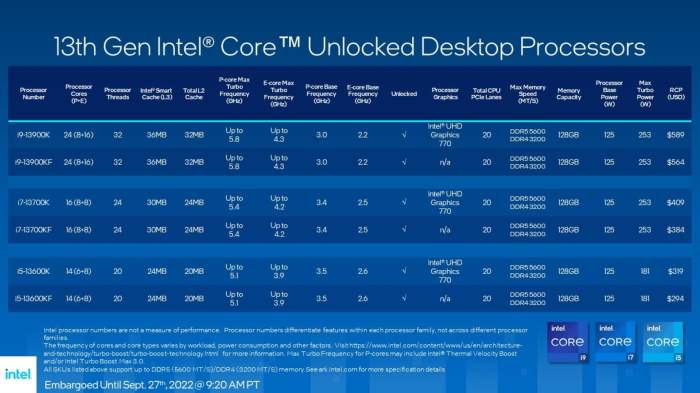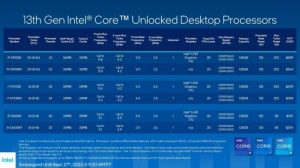
Dive into the world of Latest computer processors (CPUs) where speed, power, and efficiency collide to take your computer experience to the next level. Get ready for a journey through the latest advancements in CPU technology!
From turbo boosts to multi-core wonders, we’ll uncover the secrets behind these tiny yet mighty components that drive our digital lives.
Latest computer processors (CPUs)
Upgrading the CPU in a computer can significantly enhance its overall performance by increasing processing speed, improving multitasking capabilities, and reducing lag during resource-intensive tasks.
Key Features of Recent CPU Models
- Increased number of cores and threads for better multitasking
- Higher clock speeds for faster processing
- Improved power efficiency for reduced energy consumption
- Enhanced cache memory for quicker access to frequently used data
Impact of Advanced CPUs on Gaming and Productivity
Advanced CPUs have revolutionized gaming experiences by providing smoother graphics, faster load times, and improved overall gameplay. They also play a vital role in enhancing productivity tasks such as video editing, 3D rendering, and data analysis by reducing processing times and increasing efficiency.
Computer Repair and Consulting
When it comes to computer repair and consulting, CPU-related issues are some of the most common problems that users encounter. Whether it’s a hardware malfunction or a need for an upgrade, professional help is often required to ensure optimal performance.
Common CPU-related issues
- Overheating: One of the most common issues is CPU overheating, which can lead to system crashes and performance issues.
- Hardware Failure: CPUs can fail due to various reasons such as power surges, aging components, or physical damage.
- Compatibility Issues: When upgrading CPUs, compatibility with other hardware components must be considered to prevent system instability.
Diagnosing CPU problems
- Monitor Temperature: Use software tools to monitor CPU temperature and identify overheating issues.
- Check for Physical Damage: Inspect the CPU for any signs of physical damage such as bent pins or burns.
- Run Diagnostic Tests: Use diagnostic software to test CPU performance and identify any hardware failures.
Professional consulting for CPU upgrades
- Expert Advice: Consulting with professionals can help determine the best CPU upgrade for your specific needs and budget.
- Installation Guidance: Professionals can provide guidance on proper installation techniques to avoid damage to the CPU or other components.
- Optimal Performance: Upgrading CPUs can significantly improve system performance, and consulting with professionals ensures the best possible outcome.
Data Communication

When it comes to data communication within computer networks, CPUs play a crucial role in ensuring smooth and efficient transmission and processing of data. The speed and efficiency of the CPU directly impact how quickly data can be transferred and processed, ultimately affecting network performance.
Role of CPUs in Data Transmission
In computer networks, CPUs are responsible for executing instructions and processing data. When data is received or sent over a network, the CPU plays a key role in managing the flow of information, handling data packets, and ensuring that data is processed accurately and in a timely manner.
- CPU processes incoming data packets and forwards them to the appropriate destination.
- CPU manages data flow to ensure that information is transmitted efficiently.
- CPU performs calculations and operations on data to prepare it for transmission or storage.
Relationship Between CPU Speed and Data Communication Efficiency
The speed of the CPU directly impacts the efficiency of data communication within a network. A faster CPU can process data more quickly, leading to faster data transmission and reduced latency. On the other hand, a slower CPU may bottleneck data communication, causing delays and reducing overall network performance.
Higher CPU speeds result in faster data processing and improved network performance.
Impact of CPU Advancements on Data Transfer Speeds
Advancements in CPU technology, such as increased clock speeds, multiple cores, and improved architectures, have significantly improved data transfer speeds and network performance. Faster CPUs can handle larger volumes of data more efficiently, leading to faster data transfer rates and reduced latency in network communications.
- Improved CPU architectures enable faster data processing and transmission.
- Multi-core CPUs allow for parallel processing of data, increasing overall network efficiency.
- Advancements in CPU technology contribute to enhanced network performance and reduced data transfer times.
Computers E-Books

In today’s digital age, e-books have become increasingly popular for reading enthusiasts. These electronic versions of books offer convenience, portability, and accessibility like never before. Behind the scenes, the performance of computer processors (CPUs) plays a crucial role in rendering e-books and digital content seamlessly on computers.
Role of CPUs in Enhancing E-Book Reading Experience
When it comes to enhancing the reading experience on various e-book formats, CPUs are instrumental in ensuring smooth operation and compatibility. Here are some key aspects where CPUs make a difference:
- Processing Speed: Faster CPUs can handle complex e-book formats with graphics, animations, and interactive elements more efficiently, resulting in a smoother reading experience.
- Graphics Rendering: High-performance CPUs are capable of rendering high-resolution images and graphics in e-books without lag or distortion, enhancing visual quality.
- Multi-Tasking: Modern CPUs with multiple cores enable users to run e-book applications alongside other tasks seamlessly, allowing for a multitasking reading experience.
- Battery Efficiency: Energy-efficient CPUs help prolong battery life on laptops and mobile devices, ensuring uninterrupted e-book reading sessions on the go.
Influence of CPU Specifications on E-Book Applications
The specifications of a CPU can significantly impact the compatibility and performance of e-book applications. Here’s how CPU specifications come into play:
- Architecture: The architecture of a CPU affects how efficiently it processes instructions and data, directly impacting the speed and responsiveness of e-book applications.
- Clock Speed: Higher clock speeds result in faster processing of e-book content, reducing loading times and enhancing the overall reading experience.
- Cache Size: CPUs with larger cache sizes can store more data closer to the processor, speeding up access to frequently used information in e-books.
- Instruction Set: Advanced instruction sets supported by modern CPUs enable optimized performance for e-book rendering and interactive elements.
Graphics and Multimedia
In today’s digital age, the demand for high-quality graphics and multimedia content is ever-increasing. Whether it’s playing the latest video games, editing photos and videos, or streaming HD movies, having a powerful CPU is essential for smooth performance and seamless user experience.When it comes to handling graphics-intensive tasks and multimedia content, the CPU plays a crucial role in ensuring optimal performance.
The architecture of the CPU directly impacts the rendering speed and quality of graphics on computers. A CPU with a higher clock speed and more cores can process complex graphics faster, resulting in smoother animations, sharper images, and overall better visual quality.Multi-core CPUs are particularly important when it comes to enhancing the playback of multimedia files and video editing processes.
With multiple cores working simultaneously, tasks like video rendering, encoding, and decoding can be divided among the cores, leading to faster processing times and improved efficiency. This is especially beneficial for professionals who work with large multimedia files and require quick turnaround times.
The Importance of GPU in Graphics Processing
- Graphics Processing Units (GPUs) are specialized processors designed to handle complex graphics calculations efficiently.
- GPUs work in tandem with CPUs to offload graphics-related tasks, allowing for smoother performance and faster rendering times.
- Modern GPUs are equipped with dedicated memory and processing cores, making them ideal for handling demanding graphics workloads.
Computers Hardware
The hardware components of a computer are crucial for its overall performance and functionality. In this section, we will delve into the world of CPUs and how they impact computer hardware.
CPU Brands and Compatibility
When it comes to CPUs, there are several brands to choose from, such as Intel and AMD. Each brand offers different models with varying performance levels and features. It is essential to consider the compatibility of the CPU with other hardware components, such as the motherboard and RAM. Intel CPUs, for example, are known for their high single-core performance, making them ideal for tasks that require fast processing speed.
On the other hand, AMD CPUs are often praised for their multi-core performance, making them suitable for multitasking and heavy workloads. Understanding the differences between these brands and their compatibility with other hardware components is essential when building or upgrading a computer.
Evolution of CPU Technology
Over the years, CPU technology has evolved significantly, leading to faster and more efficient processors. The introduction of multi-core processors revolutionized computing, allowing for better multitasking and improved performance. The development of smaller nanometer processes has also played a crucial role in enhancing CPU performance while reducing power consumption. As CPU technology continues to advance, we can expect even more powerful and energy-efficient processors in the future.
Future Trends in CPU Design
Looking ahead, the future of CPU design is exciting and promising. With the rise of artificial intelligence and machine learning, CPUs are expected to become more specialized for specific tasks, such as deep learning and data analysis. We can also anticipate the integration of advanced technologies like 3D stacking and neuromorphic computing in future CPU designs. These innovations will not only improve performance but also open up new possibilities for computer hardware development.
Overall, the future of CPU design holds great potential for shaping the next generation of computer hardware.
Outcome Summary
As we wrap up our exploration of Latest computer processors (CPUs), remember that the heart of your computer beats with the power of these innovative chips. Stay tuned for more updates on the ever-evolving world of CPUs!
FAQs
How do CPU upgrades enhance computer performance?
Upgrading your CPU can significantly improve processing speed and overall system performance, making tasks smoother and faster.
What are the key features of the latest CPU models?
The latest CPU models come with higher core counts, faster clock speeds, improved power efficiency, and enhanced multi-tasking capabilities.
How do advanced CPUs impact gaming and productivity tasks?
Advanced CPUs provide smoother gameplay, faster loading times, and improved productivity by handling complex tasks with ease.
Why is professional consulting important for CPU upgrades?
Professional consulting ensures that the CPU upgrade is compatible with your system and optimizes performance without any issues.
How do CPUs influence data transmission in computer networks?
CPUs play a crucial role in processing and transmitting data efficiently across computer networks, affecting overall communication speed and performance.






